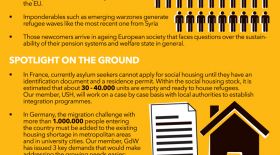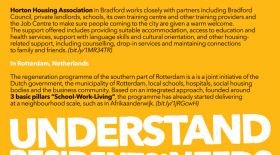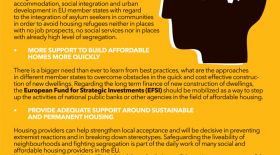The Communities of our Future
Housing, Migration and Integration
Brussels, 13 January 2016 | Published in Social
A Housing Europe policy briefing as part of the "Housing for All" campaign.
Large scale migration towards and within Europe is the new norm for many reasons. As political leaders are still trying to come up with solutions, housing associations and local authorities are dealing with their greatest challenge in recent history. How can the communities of our future be shaped in a sustainable way? What is the role of affordable housing providers? What is the key to integration? How can policies deliver results more efficiently? Why an holistic approach is needed?
A new reality
Large scale migration towards and within Europe is the new norm for 4 reasons:
1. Climate change and drought reshape the environment in which people live in and trigger their search for alternatives.
2. The economic osmosis of the recent years is changing the living conditions in many countries pushing more and more people to move in search of better quality of life. The internal market only accelerates these mobility trends within the EU.
3. Imponderables such as emerging warzones generate refugee waves like the most recent one from Syria.
4. Demographics set another major challenge for European communities regarding working opportunities and insurance systems, increasing thus (labour) mobility.
Spotlight on the ground
- In France, currently asylum seekers cannot apply for social housing until they have an identification document and a residence permit. Within the social housing stock, it is estimated that about 30 -40.000 units are empty and ready to house refugees. Our member, USH will work on a case by case basis with local authorities to establish integration programmes.
- In Germany, the migration challenge with more than 800.000 people entering the country must be added to the existing housing shortage in metropolitan areas and in university cities. Our member, GdW has issued 3 key demands that would make addressing the growing needs easier: a) temporarily lowered standards & accelerated procedures b) ensuring social support c) considerably more cost-effective construction.
- Sweden has been for years one of the countries in Europe receiving the highest proportion of asylum seekers compared to its population. By the end of 2015, the country had received between 140,000 and 190,000 asylum seekers. Most Swedish municipalities lack both temporary and permanent housing solutions. Our member, SABO has managed through framework agreement procurements of Kombohus to cut construction costs while reducing energy demands, showing the way forward.
The integrating role of housing providers
Part of the daily job of social housing providers is to understand residents' needs and provide early support, which could take various forms: from employment and skills training to advice on welfare support and direct care provision. They already cooperate with a wide range of stakeholders from various sectors, including health and homelessness, within the community, even more now that communities and neighbourhoods are hit by unemployment and poverty as well as new migration flow.
- In Lyon, France
The Accelair programme was launched in 2002 within the framework of EQUAL and aims at fostering social and professional integration of refugees through a coordination response providing access to employment, training and housing.
- In Bradford, UK
Horton Housing Association in Bradford works closely with partners including Bradford Council, private landlords, schools, its own training centre and other training providers and the Job Centre to make sure people coming to the city are given a warm welcome. The support offered includes providing suitable accommodation, access to education and health services, support with language skills and cultural orientation, and other housing-related support, including counselling, drop-in services and maintaining connections to family and friends.
- In Rotterdam, Netherlands
The regeneration programme of the southern part of Rotterdam is a is a joint initiative of the Dutch government, the municipality of Rotterdam, local schools, hospitals, social housing bodies and the business community. Based on an integrated approach, founded around 3 basic pillars “School-Work-Living” the programme has already started delivering at a neighbourhood scale, such as in Afrikaanderwijk.
How to make it happen
At a time when many countries are at a crossroads regarding their housing policy, it has to be ensured that they choose the right path for this transition. Housing and housing-related policies have to deliver concrete results at a much faster pace. An holistic approach to migration must address accommodation & housing from a number of perspectives:
- Emergency mobilisation of resources: A challenge being faced by local authorities;
- Temporary housing: use of existing buildings/alternatives to regular stock;
- Medium & Long term Housing Needs including social issues - the impact of new influx;
- Social inclusion of immigrants
- Integration: Local experience which shows what can work on the ground


